|
|
|
Sort Order |
|
|
|
Items / Page
|
|
|
|
|
|
|
| Srl | Item |
| 1 |
ID:
155479
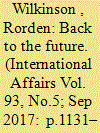

|
|
|
|
|
| Summary/Abstract |
This article reflects on the role crises play in enabling existing systems of global economic governance to evolve and endure while also preserving underlying power dynamics. The article uses as its case-study global trade governance. Its aim is to explore the impact of the negotiating crises that beset the World Trade Organization's (WTO) Doha round of trade negotiations. The article traces how, over the course of the Doha round, periodic crises resulting from divergent pressures for opposing outcomes combined to preclude one set of institutional developments from resulting (those on which the Doha round had been launched and the basis upon which developing countries negotiated) while enabling others (those advanced by the leading industrial states). The result has been to usher in changes that have returned global trade governance to a form of system management more familiar to observers of the multilateral trading system of the 1970s. This ‘retro’ form of trade governance signals a departure from the more inclusive system that had emerged from the Uruguay round of the General Agreement on Tariffs and Trade (GATT) and evolved during the WTO's early years, replacing it with a lither system of mini-lateralism more fit for industrial country purposes.
|
|
|
|
|
|
|
|
|
|
|
|
|
|
|
|
| 2 |
ID:
155478
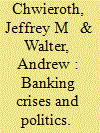

|
|
|
|
|
| Summary/Abstract |
Were the extensive policy responses of many governments to the financial crises of 2007–9 and the political events that have followed them exceptional? We show that over the course of nearly 150 years, severe banking crises have become more consequential for policy and politics in democracies than ever before. First, governments have become much more likely over time to opt for extensive bailouts and other policies aimed at wealth protection during crises. Second, the inclination of voters to punish governments that are in office when crises occur has also increased sharply over time. We argue that the main cause of both developments is the rise of ‘great expectations’ among large segments of society in modern democracies regarding public responsibility for the protection of wealth in the post-1945 era. Especially since the 1970s, severe banking crises returned and have posed a growing threat to this wealth and thus to the prospects of many households, including large segments of the ‘middle class’. This rising ‘mass pressure from below’ on governments to secure household wealth has provided an important source of pressure on policymakers to respond with increasingly costly bailouts, with powerful and ongoing political consequences.
|
|
|
|
|
|
|
|
|
|
|
|
|
|
|
|
| 3 |
ID:
155477
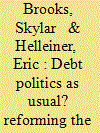

|
|
|
|
|
| Summary/Abstract |
In the wake of the 2008 financial crisis and costly debt restructurings in Greece and Argentina, the sovereign debt restructuring regime (SDRR) has been reformed in a number of ways. Taken together, these reforms have had a mixed impact in comparison to existing governance arrangements put in place during the early 2000s: changes to IMF lending rules have weakened the regime, reforms to sovereign bond contracts have strengthened it, and a UN-centred initiative to construct a new multilateral debt restructuring framework has had little impact in either direction. The pattern of post-2008 change reveals that reforms focusing on pre-defined rules to trigger debt restructuring (the IMF lending reforms) are less likely to succeed than those focused on the process of restructuring once the decision to restructure has been taken (contract reforms). It also shows that efforts to build comprehensive, multilateral legal frameworks for debt restructuring (the initial goal of the UN initiative) face enormous obstacles. At a more theoretical level, the post-2008 experience highlights the enduring power of the United States and leading European states to shape outcomes in this sector, as well as the need to embrace eclectic theoretical frameworks in analysing the complicated politics of SDRR reform.
|
|
|
|
|
|
|
|
|
|
|
|
|
|
|
|
| 4 |
ID:
155480
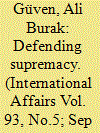

|
|
|
|
|
| Summary/Abstract |
It is widely acknowledged today that the rise of new powers in the global economy has failed to produce commensurate adjustments in the architecture of global economic governance. How, then, do established multilateral organizations navigate the challenges arising from growing multipolarity? The article tackles this question by examining recent International Monetary Fund (IMF) and World Bank practice. It argues that, resistant though the Bretton Woods twins are to comprehensive reform, they nonetheless employ mechanisms to cope with the new realities on the ground. However, this adaptation lacks a cohesive strategy, and on balance remains insufficient. The analysis launches from a discussion of the normative, operational and competitive challenges the Fund and Bank face. It then discusses three coping mechanisms the organizations have employed over the past decade: 1) bolstering operations in low-income countries (LICs) and small middle-income countries (MICs); 2) adopting a flexible approach towards large MICs and in particular emerging powers to retain them in the organizations' client portfolio; and 3) reinforcing and refining non-lending activity to preserve normative authority. The effectiveness of these adaptive efforts in addressing the challenges of multipolarity is variable, comprising a mix of modest gain, abject failure and untested promise. Implications for the organizations' efficacy also remain uncertain. Even then, these initiatives highlight the twins' willingness to defend their institutional supremacy in a fast-changing global system. Crucially, they also harbour important signs of change in how ‘development’ is perceived and practised in the strongholds of western multilateralism.
|
|
|
|
|
|
|
|
|
|
|
|
|
|
|
|
| 5 |
ID:
155474


|
|
|
|
|
| Summary/Abstract |
Six months into the Trump presidency, scholars and pundits are already speculating whether the president has developed a ‘doctrine’ or, more expansively, a ‘grand strategy’. No doubt, unfolding events—in Asia, the Middle East and possibly Europe—will sustain this debate about Trump's strategy in the months and, possibly years, to come. It will be prompted by disparate events that stretch from directing vocal threats to the North Koreans regarding their nuclear program to demands that NATO members increase their defence budgets. But, stepping back from Washington's and the media's news cycle, it is worth noting that such deliberation about the Trump presidency is unexceptional. Grand strategy debates are always fashionable. What is overlooked in these raging debates is a prior question: can Donald Trump—or any other American president—implement a grand strategy in the twenty-first century? Our answer is no, they can't. Despite the professed differences among US presidential administrations, each in fact responded to them in markedly similar ways. In fact, we argue, Americans may debate a variety of grand strategies. But a combination of systemic international challenges and bureaucratic tussling between civilian and military leaders ensures that any presidential administration simultaneously implements a variety of calibrated strategies (ranging from liberal institutionalism to restraint and even neo-isolationism), depending on the circumstances.
|
|
|
|
|
|
|
|
|
|
|
|
|
|
|
|
| 6 |
ID:
155481
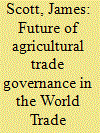

|
|
|
|
|
| Summary/Abstract |
liberalization in agriculture to broader deals involving multiple sectors through the principle of the single undertaking, but the World Trade Organization's (WTO) Nairobi ministerial conference of 2015 has abandoned that principle, shifting the multilateral trade system onto a new trajectory. Using the broad body of political economy theory, this article argues that there is now very little prospect that the WTO will be able to liberalize agricultural trade, with the consequence that the WTO will be unable to expand the trade opportunities of those countries that specialize in producing agricultural commodities. For this reason, the multilateral trade system looks increasingly ill-suited to the commercial needs of those low-income countries that are reliant on exporting agricultural goods and the promise of development through expanding trade based on comparative advantage is being tacitly pushed aside. This article argues that the abandonment of the single undertaking demands a deep reflection by WTO member states and other stakeholders on the underlying principles of the WTO, its future direction and how trade opportunities will be created for all within a system that has effectively abandoned further liberalization within agriculture.
|
|
|
|
|
|
|
|
|
|
|
|
|
|
|
|
| 7 |
ID:
155482
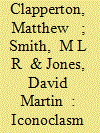

|
|
|
|
|
| Summary/Abstract |
This article analyses the way in which the group calling itself the Islamic State in Iraq and Syria (Islamic State) manages cultural heritage sites under its control. By drawing on three different cases—Palmyra; Sufi, Shi'a and Sunni heritage sites; and Mosul—it examines the way in which the logic of Islamic State's iconoclasm might also be considered a strategy. To be considered strategic the contention is that three factors need to prevail: the degradation and delegitimization of the existing societal fabric, the removal of all reference to the previous society, and an attempt to reconstruct society in keeping with a new ideological vision. When these three factors are present and interconnected then iconoclasm as a strategy can be said to be manifest. In the case of Islamic State, this article also seeks to illustrate that its actions may broadly be categorized as either pragmatic or dogmatic, thus creating an inconsistent dichotomy within Islamic State's rhetoric. The article frames such a dichotomy within the context of a strategic narrative both in order to be able to connect pragmatic Islamic State policy to action and to show that when rigid doctrine clashes with the exceptionality of war an irresolvable paradox is created.
|
|
|
|
|
|
|
|
|
|
|
|
|
|
|
|
| 8 |
ID:
155484


|
|
|
|
|
| Summary/Abstract |
This literature review seeks to reorient the discourse on radicalization to consider the connection between communication technology and violent extremism. By interrogating three central questions vexing policy-makers, law enforcement officials and academics, this review moves away from a monolithic understanding of the internet and showcases the opportunities afforded by different communications technologies within the context of radicalization and recruitment. As this discussion shows, there is a consensus that despite significant exceptions to the rule, the internet alone does not act as a radicalizing agent, but rather serves as a facilitator and catalyst for terrorist organizations and their respective networks. Despite varying analyses produced within the literature, there is agreement that the virtual sphere does not replace the real world in most instances. Above all, a review of the current literature demonstrates that to answer the crucial questions posed in this article, more empirically-based research is required.
|
|
|
|
|
|
|
|
|
|
|
|
|
|
|
|
| 9 |
ID:
155483


|
|
|
|
|
| Summary/Abstract |
Based on 16 months of fieldwork conducted in Malawi and Zambia between 2005 and 2014, this article advances debates on North–South relations by providing an actor-oriented view of donor politics. Drawing upon 152 interviews, 104 focus group discussions and a series of observations, it demonstrates how local people instrumentalize the fuzziness of ‘empowerment’ discourses to gain resources, status and opportunities. Our analysis of how local people push back against top-down dictated policies and structures in international affairs is highly pertinent because of Africa's extreme dependency on external resources for the AIDS response. We argue that the malleability of ‘empowerment’ in the AIDS enterprise has strategic advantages for seemingly dependent people living with HIV. Through ‘performances of compliance’ that mimic dominant ideologies, ‘extraversion’ that plays up recipients' weakness in global structures, and silence and humour that extend beyond the limits of the spoken word, locals embrace the elasticity of ‘empowerment’ and show agency despite the constraints of poverty, aid dependence, hunger and unemployment. These actions close the space for actual transformation of local people's lives because they create power imbalances within communities, privileging some while silencing and disadvantaging others.
|
|
|
|
|
|
|
|
|
|
|
|
|
|
|
|
| 10 |
ID:
155476
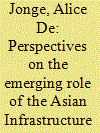

|
|
|
|
|
| Summary/Abstract |
This article uses recursivity theory to examine the emerging nature and position of the Asian Infrastructure Investment Bank (AIIB) from four different perspectives. Part one describes important domestic drivers within China providing motives for the AIIB initiative. These include domestic overinvestment in infrastructure and construction, combined with environmental stresses compelling the shift towards a more sustainable economy. Part two examines regional networks and linkages that the AIIB is becoming part of. These include China's ‘one belt, one road’ initiative, and various collective initiatives based around ASEAN. In part three, this article explores the AIIB's appearance on the development finance scene as an example of ‘contested multilateralism’—where a new multilateral institution emerges to challenge the rules and practices of existing institutions. The AIIB has entered into co-financing agreements with many of its multilateral development bank peers. Its standards and procedures are strongly influenced by existing ones, even while it begins to influence the practices of its partner multilateral development banks. Part four examines the potential influence of a future alliance between the AIIB and the UNCCC's Green Climate Fund. Such an alliance would require an even greater degree of compliance by the AIIB with global standards of transparency and good governance, as well as expanding the scope for the AIIB to influence regional climate change adaptation and mitigation infrastructure initiatives.
|
|
|
|
|
|
|
|
|
|
|
|
|
|
|
|
| 11 |
ID:
155475
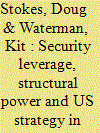

|
|
|
|
|
| Summary/Abstract |
What is the utility of US military power when seeking to generate international economic arrangements preferential to its national interests? Conventional theories of relational power, whereby actor A compels actor B against their own will, offers a narrow range of explanations. We argue that theories of structural power, whereby an actor can utilize positional advantages to shape the structural contexts of other states international preferences offers a more nuanced account of the close interaction between geopolitics and the global economy. We taxonomize structural power into positive and negative components, applying these to a case-study of regional American primacy in east Asia. We argue that US primacy has allowed it to leverage its military power into generating political–economic institutional outcomes that have reinforced its broader leadership role. The US may well continue its deep engagement or follow a path of retrenchment under President Trump, but both grand strategic options will impact on its capacity to leverage such structural power and have implications for US hegemony and the region's political economy.
|
|
|
|
|
|
|
|
|
|
|
|
|
|
|
|
|
|
|
|
|